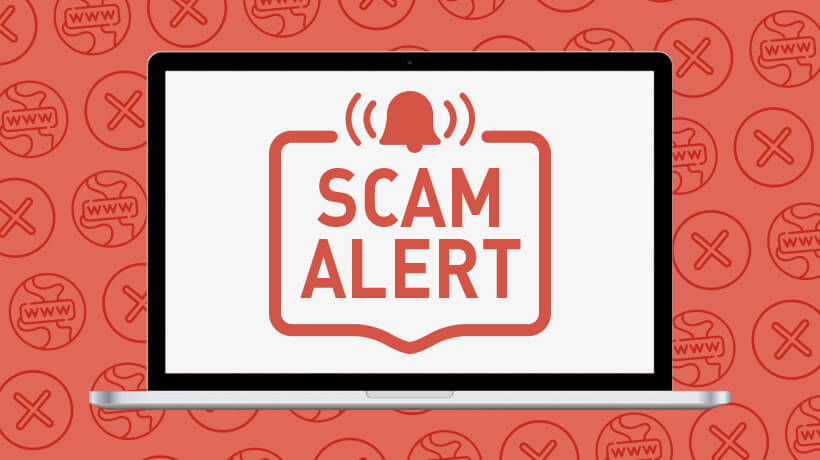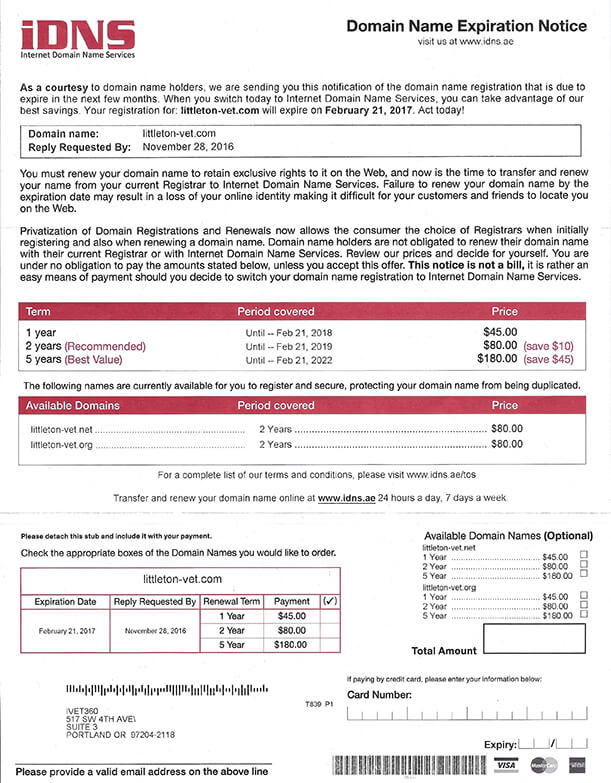
Don’t Be Fooled by Veterinary Domain Scams
While the internet has brought about revolutionary changes to how we market veterinary hospitals, it’s also given scammers many more opportunities to trick business owners into buying their “products.” One particularly insidious scam involves official-looking correspondences from companies trying to overtake domain names. These scams are easy to fall for, especially since veterinary hospital owners and practice managers are aware that their domain names are crucial for maintaining brand identity. You already know that losing your domain would be detrimental to your hospital’s success online. It’s important to recognize these scams so you don’t throw your money in the wrong direction and transfer control over your domain to a company with poor intentions.
Recognizing Domain Scams
To protect yourself from these scams, you must first be able to recognize them. These scams often come through letters in the mail, confusingly worded emails or, rarely but still possibly, over the phone. These notices usually say that if you do not respond and pay the company—usually named something general with phrases like “Domain Services” or “SEO Company”—you will lose your domain or server and your website will disappear from all search engines. These are all scary thoughts, so many people fall for these scams. However, these companies don’t actually own your domain, and they charge exorbitantly high costs for the services they’re supposedly offering so they can take ownership of your domain. These fees are often steep and are much higher than what your actual domain provider would charge. When you pay and register through these companies, you transfer domain ownership to them, giving them control, which could potentially spell trouble.
How does this happen? Many people don’t know which company they used to purchase their domain, perhaps because they purchased access for five or 10 years from the start. They don’t recognize that the letter is not coming from the company that actually owns their domain.
Plus, the letters and emails often try to confuse people with onslaughts of vague language. At iVET360, one notice we received for a client’s website said if we failed to register with this company, it may “result in the cancellation of this search engine optimization domain name notification proposal notice.” In these cases, these companies are hoping you will be confused, but worried, and will pay up anyway.
Tips for Protecting Your Domain and Your Wallet
Don’t fall prey to these tricks. Follow these guidelines to make sure your domain is protected and your registration is current—and to make sure you aren’t giving the wrong company your money.
- Keep track of who owns your domain. The two most common domain providers are GoDaddy and Network Solutions. If you have no idea who owns your domain, visit whois.domaintools.com and enter your domain name. The site will tell you who owns the domain, where you purchased it, the expiration date and the server on which it is hosted.
- Pay your current registrar to keep your domain registration private. This will keep you from getting these notices in the first place. These companies aren’t actually doing anything illegal; information about all domains, including who owns them, is public unless you pay to protect it. GoDaddy, for example, offers “privacy protection” for a small yearly fee, and this keeps anyone from finding out who owns your domain.
- Keep your payment information up to date with your domain provider. You could actually lose your domain if you don’t have auto-renewal and you don’t renew in time and/or if your credit card attached to your account is declined. Your domain provider will email you a month before your domain expires and a month after it expires. Make sure whoever receives these notices checks their email regularly, and if any credit card or billing information ever changes, keep it updated with your domain provider at all times.
Many veterinary services companies, including iVET360, handle all of this registration and renewal information for their clients, giving veterinary hospitals peace of mind. We keep track of this, so we know immediately when one of these reports is bogus. Plus, we never charge extra for website maintenance, and we include domain registration fees in our monthly rates. Whether you do or don’t work with external firms for things like your hospital’s marketing, you should always have someone looking out for your hospital online, like an IT company. Don’t let anyone take advantage of your desire to run an efficient, visible veterinary hospital.
To learn more about how we can help manage this for you, call us at 503.765.6360 or email [email protected].








